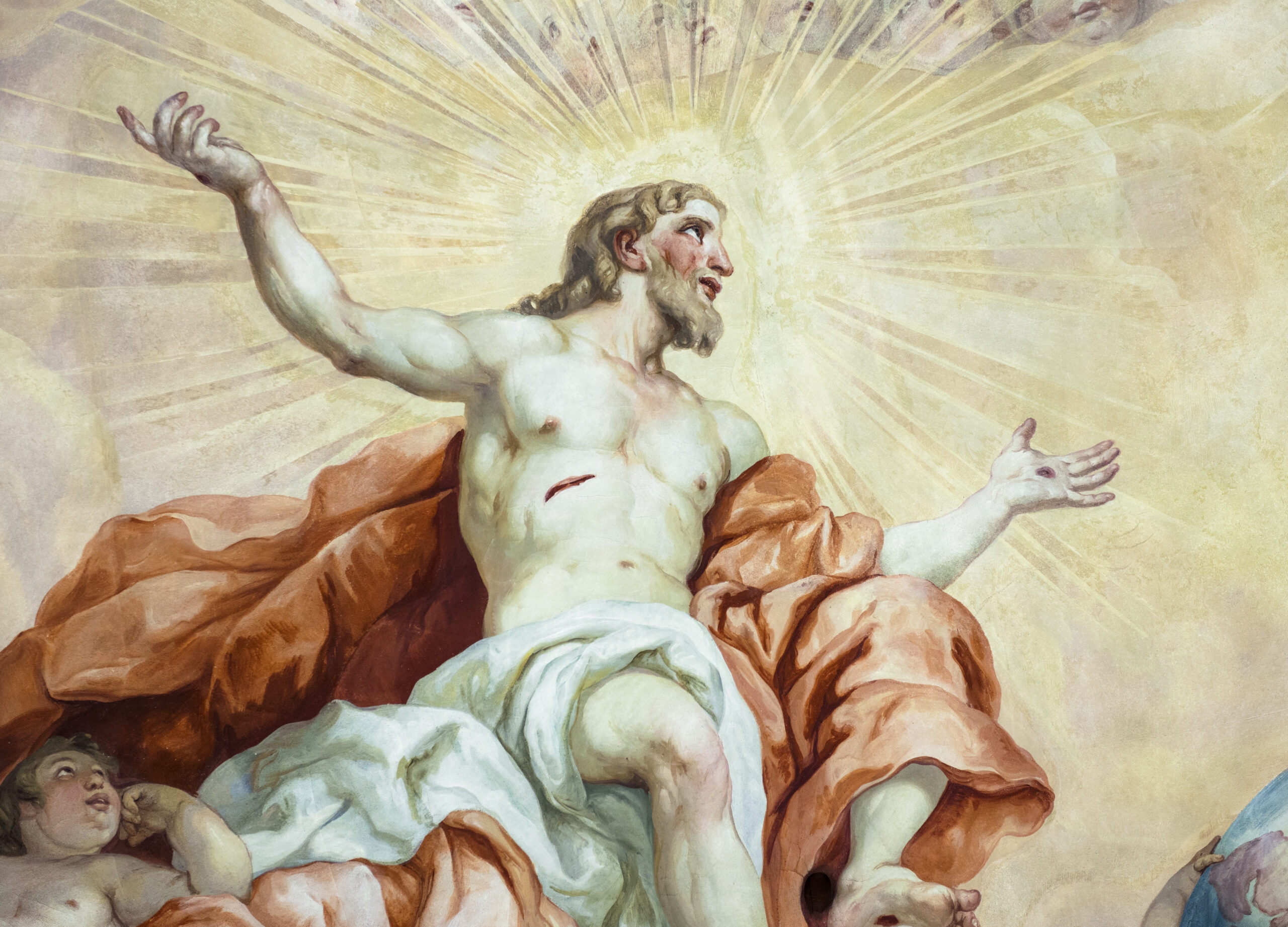Editor’s note: The following essay, by Timothy Radcliffe, O.P., is the English-language preface to “The Via Crucis of a Gay Man,” a reflection on Christ’s Passion by Luigi Testa. The preface is reprinted here in its entirety and with the author’s permission. It has been edited for style and clarity. References in the text to “Luigi” refer to the author of the book.
Thank you, Luigi [Testa], for having the courage to share with others your own painful but beautiful Via Crucis. So many people walk their own Way of the Cross alone and afraid. This may be because of their sexual orientation, because they are H.I.V.-positive, because they bear the scars of abuse or a hundred other reasons. But you, Luigi, know that we never walk alone because Jesus walks with us all.
The song “You’ll Never Walk Alone” was originally from a musical composed in 1945, the year I was born. But it has become a song that resonates for so many people in our time of great loneliness. Fans of the Liverpool Football Club sing it, and during the Covid pandemic, it became the song of medical workers and people isolated in their rooms.
But the Lord walks with us in a more intimate sense than we can imagine, at the very centre of our being, sharing our woes and joys. St. Augustine said of God that he is closer to us than we are to ourselves. Though we may feel it, we cannot be alone because in our deepest interiority is God.
Though we may feel it, we cannot be alone because in our deepest interiority is God.
Luigi’s book is a gift for all who feel isolated, especially because they are gay. He dares to step into visibility and encourages us all to do so, confident that the Lord loves us as we are, and so we never need to be afraid of the light. After the story of the Fall in Genesis, Adam and Eve need clothing because they are ashamed. In the early church, people were baptised naked, since the time of shame was over.
Gregory of Nyssa described baptism as “casting off these fading leaves which veil our lives we should once again present ourselves before the eyes of our Maker.” And there is an ancient Eastern prayer that says, “Unveil our eyes, give us confidence, do not let us be ashamed or embarrassed, do not let us despise ourselves.”
Often people present masks to the world and project false images they hope will protect them from being wounded. But God loves each of us as we are, and when people see our humanity, with its beauty and fragility, its vulnerability and strength, even our failings, how can they not love us? In the marvellous novel Gilead by Marilynne Robinson, the old pastor writes: “Any human face is a claim on you, because you can’t help but understand the singularity of it, the courage and loneliness of it.”
Hatred is usually for abstractions: “those immigrants” or “those foreigners” or “homosexuals.” The other person in their unique humanity, made in the image and likeness of God, becomes abstracted as one of “them.” Luigi has dared to show himself as he is, with his warmth and love and longing, and so we love him for doing so even if we have not yet met him.
Pope Francis has written that “realities are greater than ideas.” God loves what is real, what is sustained in being by the One whose name is I AM.
St. John says that Jesus, on the night before he died, washed the feet of his disciples. Christ embodied a particular, delicate attention to each disciple. Chet Corey catches it in her poem, “Footwashing”:
Pigeon-toed Matthew’s foot, the bunion
on John’s big toe–and those of Thomas,
large as potatoes, the ache of gout
great in the left big toe; Philip’s small feet,
the well-formed feet of Bartholomew
and Andrew, the quiet feet of Thaddaeus,
as if he were not walking among them,
unnoticed like James, son of Alphaeus,
whose feet were winter dry to his touch.
The Way of the Cross touches us most deeply when we imagine not just the suffering of Jesus, but when we feel a tenderness towards him in this bodily suffering. Women often feel this most acutely, and it was mainly women who gathered at the foot of the Cross to be close to Jesus in his last moments.
All beautiful faces prepare us to see the one whose face is most beautiful, and in whose light all faces shine.
When Mary Magdalene meets the risen Christ in the garden, she wants to touch him. St. Catherine of Siena, the 14th-century Dominican, had a profound sense of physical tenderness for Jesus, who is not just a savior but our most gentle Lord. It is rare that male saints are able to feel or express that same intimacy with the suffering Jesus.
It is there in St. John of the Cross’s poem, where he longs for Jesus as for a lover.
Upon a gloomy night,
With all my cares to loving ardours flushed,
(O venture of delight!)
With nobody in sight
I went abroad when all my house was hushed
[…]
Lost to myself I stayed
My face upon my lover having laid
From all endeavour ceasing:
And all my cares releasing
Threw them among the lilies there to fade.
In his Via Crucis, Luigi’s gift is to open us all to the deepest tenderness for Our Lord, whom he wishes to embrace and kiss and caress. This gives deep joy and sorrow to his walking with Christ.
In the Eleventh Station, when Jesus is nailed to the cross, Luigi writes, “Those hands that caressed me so many times, that clasped me as I lost my balance and lifted me up—they are nailed, immobile, still. You can no longer embrace me; you cannot caress me. Those feet—that walked with me so often, that I so often wanted to cover with kisses as Mary does on the eve of your passion—are now fixed to the cross with nails, paralysed. You can no longer walk with me. You cannot chase me if I run away.”
Luigi is also intensely aware of other aspects of the Lord’s bodily existence, such as his face. Israel longed to see the face of God: “Let your face shine on us and we shall be saved” (Ps. 67). Yet Israel could not see the face of God and live. This face became the flesh and blood of a man who died on the cross. But how often do we long to see that face we cannot even imagine? This is our unimaginable happiness, the beatific vision.
The goodness of our bodily existence is at the heart of the greatest Christian teachings.
Luigi’s life and love has prepared him to delight in this face. When Jesus meets Veronica in the Sixth Station: “The woman stands there as you are carried away and still, you turn to look at her. In her hands is the cloth with which she wiped your face, bearing imprinted—in blood—your sweet features. Your beautiful face, my sweet Jesus. Beauty crowned with thorns, beauty scorned, beauty mocked and rejected. Beauty defiled.”
All beautiful faces prepare us to see the one whose face is most beautiful, and in whose light all faces shine. Geard Manley Hopkins, the Jesuit poet, writes:
Christ plays in ten thousand places,
Lovely in limbs, and lovely in eyes not his
To the Father through the features of men’s faces
In the Sistine Chapel, Michelangelo illustrates God reaching out to touch the sleeping Adam and give him life. In Genesis, Adam is not created just with a word, like the other animals, but God “forms man from the dust of the ground” (2.7). Jesus reaches out to touch the untouchable, the sick, the lepers. He is God’s creative healing touch. Shigeto Oshida, the Japanese-born Dominican mystic, liked to call him “The Hand of God.”
Luigi has a deep sense of the beauty of that touch and he longs for it. At the end of the Stations, he cries out: “Now that I have come to the end, keep me with you. I will not be obedient like Mary Magdalene; I will not stop at your ‘Don’t touch me, don’t hold me.’ I will touch you instead. I will hold you. I will not detach myself from you, and we will remain together forever in the garden of resurrection.”
The goodness of our bodily existence is at the heart of the greatest Christian teachings: Creation, Incarnation, the gift of Christ’s body in the Eucharist, the resurrection of the dead. How can we love our faith if we are afraid of our bodily lives? How can we love our faith if we dare not look each other in face and see each other in the image of our God?
Delightfully, Luigi has Jesus bend down to write in the earth so that the woman accused of adultery can see his face (Jn. 8).
Who knows, perhaps he stooped down with the excuse of writing on the ground because he wanted you to see his face, not just his legs, his feet. You don’t know how many women, how many men, will envy you, Mary, because you were allowed to meet his gaze while everyone condemned you.
You do not know how many will be dragged naked by angry faces without mercy, without modesty, into judgement without any respect for any intimacy, and they will not find a face to say: ‘I do not condemn you.’
Last October, at the end of the first session of the Synod on Synodality in Rome, I asked a woman, whom I like and admire, what she thought of the Synod report. She said that it was too theological. “What do you mean?” I asked. “Too abstract,” she said.
How can we love our faith if we are afraid of our bodily lives?
It is paradoxical that our Christian theology of God, who became flesh, might be thought of as abstract. Yet Christian theology is often abstract, remote from the heartbeat, the touch and taste of humanity, our lived sorrow and joy.
Yves Congar O.P., one of the fathers of the Second Vatican Council, liked to quote Charles Péguy: “Not the true but the real.” Luigi’s Via Crucis tells of a gay Christian following the Lord in all the real complexity of a human life. Thanks be to God!




Timothy Radcliffe, O.P.´s essay is so beautiful for all of us created in the image of God, who does not despise our physical nor our spiritual nakedness. The Way of the Cross has taken on new and deeper meaning. Thank you.